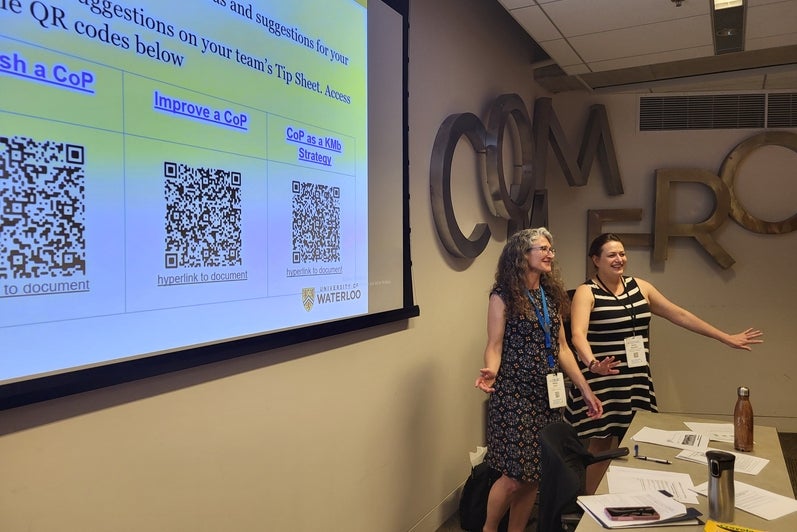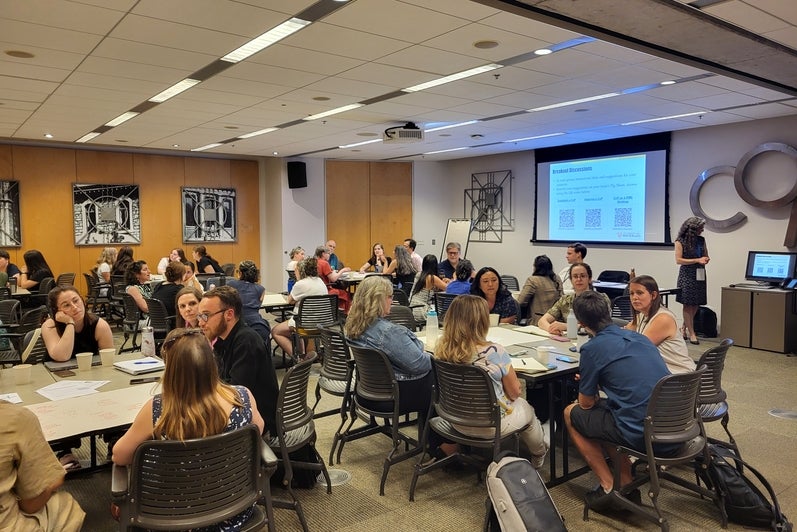Building bridges: Sharing the Water Institute’s approach to knowledge mobilization
The Water Institute’s Nancy Goucher contributes to the field of knowledge mobilization at the Canadian Knowledge Mobilization Forum
By Nancy Goucher
The evolving field of knowledge mobilization
While Knowledge Mobilization (KM) is almost always part of funding proposals, it is still an evolving and relatively new area of practice. This was made clear at last week’s Canadian Knowledge Mobilization Forum in Montreal where more than half of the attendees indicated that they were in their positions for five years or less.
Yet KM, or the practice of transforming research into real-world impact, is increasingly relevant for both universities and society. In today’s fast paced world with a complexity of challenges, Canada’s research community must advance the practice of KM to ensure their publicly funded work contributes positively to society.
Hosted by Research Impact Canada, the conference brought together a community of about 300 passionate knowledge mobilizers from a variety of sectors including academia, healthcare, not-for-profit, and government. The diversity of representation provided an excellent opportunity to learn about new best practices, tools, and resources.
Innovating knowledge mobilization strategies
The Water Institute’s Nancy Goucher co-delivered two workshops at the conference, each focused on strategies for improving commonly used KM practices.
- Leveraging communities of practice for knowledge mobilization, innovation, and learning
Along with UWaterloo colleague, Nadine Quehl, senior manager, knowledge mobilization and partnerships from the Office of Research, Goucher shared her experiences with co-founding and facilitating the University of Waterloo’s KM Community of Practice (CoP). Attendees collectively discussed how to replicate Waterloo’s success in establishing a network that breaks down disciplinary and departmental silos while promoting cross-learning and skills development for individual members.
This dialogue-based session also considered how CoPs can be used a KM tool in research. The structure lends itself well to projects that want to build capacity within a specific community to leverage research findings and translate them into actionable next steps.
- Navigating the shift: Exploring the impact of fewer in-person connections on knowledge sharing, innovation, and research impact
In this session, hosted by the Waterloo Wellington Knowledge Mobilization Community, Goucher and her colleagues discussed how knowledge mobilizers need to adapt to changing behaviours around event attendance and engagement. Attendees discussed what it takes to host a successful event, whether it is in-person, online, or hybrid. Results emphasized the importance of clearly defining the event's goals from the outset and using them to guide key decisions, including guest invitations, meeting format, and facilitation activities.
The Water Institute’s knowledge mobilization model sets University of Waterloo apart
Often, the most valuable insights at a conference come not from the formal sessions, but from informal conversations during breaks. I learned that many universities develop KM tools and resources for researchers to use independently to support their KM plans.
The Water Institute on the other hand, is experimenting with a different model that offers direct support to faculty through integration with the research team. This approach allows us to identify impact opportunities in real-time and deliver tailored knowledge mobilization strategies.
For instance, I can help design and deliver innovative annual project meetings that serve as crucial touchpoints for project partners. This service from the Water Institute not only saves faculty time but also utilizes specialized KM skills to facilitate meetings that effectively promote knowledge exchange, foster genuine relationships with partners, and creates an engaging and enjoyable experience for all participants.
Knowledge mobilization is all about people
Another common theme at the conference was the emphasis on KM as a people-first approach. In his keynote address, Peter Levesque–founder of the Institute for Knowledge Mobilization–stated, “Knowledge mobilization is all about people and the relationships between them.”
It is for this reason that the most effective KM strategies tend to be ones that focus on outcomes such as network building, trust building, and establishing genuine interactions.
This idea was also reinforced by another presenter at the conference, Julia Moore. When she was asked about the time-consuming nature of building relationships, she emphasized focusing on quality over quantity. The number of interactions matters less than the depth of connection. To illustrate, she shared a personal example: when she spends time with her children, they benefit more when she fully engages and plays with them, rather than doing something passive such as watching television. A great knowledge mobilizer can help design highly engaging and valuable opportunities that can result in significant time savings as well as more effective relationship building, and, ultimately, research impact.
Successful KM starts with someone asking how they can help make the world a better place. In the field of water, it is about caring for the needs of water practitioners – to meet them where they are at, understand the barriers and opportunities that exist, and arming them with helpful knowledge, ideas, and innovations that can be used to promote sustainable water management.
Overall, the conference was inspiring and energizing. KM has a bright future pushed forward by dedicated and passionate experts from across the country. And UW is helping to lead the way.
The Water Institute is all about impact
Overall, it was clear from the conference that successful knowledge mobilization (KM) begins with individuals dedicated to find ways to improve the world. For the Water Institute, this involves addressing the practical needs of water practitioners—meeting them where they are, understanding existing barriers and opportunities, and equipping them with valuable knowledge, ideas, and innovations to enhance sustainable water management.
For more information about how you can access the Water Institute’s knowledge mobilization resources, please contact Nancy.goucher@uwaterloo.ca.
Photos: (L) Nadine Quehl and Nancy Goucher at the Canadian Knowledge Mobilization Forum in Montreal .



